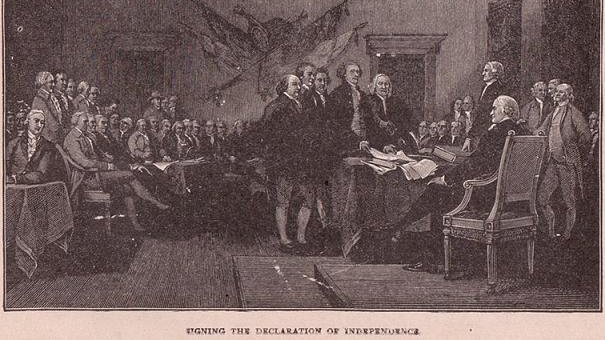An illustration of the signing of the Declaration of Independence.
PITTSBURGH, June 28 (UPI) -- Nearly 240 years have passed since America first declared its independence. Since then, our population has become healthier, better sheltered and more mobile than our 18th-century counterparts. The poorest of us today live lives that would have been science fiction to the country's founders.
These changes make it easy to dismiss the founders' ideas about the proper role of government in society as "quaint." Yet, we would be wrong to do so.
Though our trappings are much improved, we are fundamentally the same. And that makes all the difference when it comes to economics. An economy merely produces the trappings. An economy is the sum total of human behavior. And as long as human nature remains constant, so too do the laws of economics.
Recall the sovereign debt crisis Europe experienced during America's very first presidential administration. As George Washington took the oath of office, France -- one of the world's largest economies of the day -- was breaking apart. The breakup was the result of decades of economic decline engendered by ever-growing government interference in the economy. Today, the European Union flirts with similar dissolution in the wake of decades of profligate spending by some of its member countries.
Domestic similarities abound, too. In the last year of Abraham Lincoln's administration, the federal deficit was 10 percent of gross domestic product -- about the same as in 2009. Toward the end of Andrew Jackson's administration, Americans who perceived that immigrants were taking their jobs fought to restrict immigration. Following John Quincy Adams' presidency, concerned citizens sought to make alcohol illegal. (Remnants of prohibition survive today in state control of alcohol markets and in the prohibition of recreational drugs.)
What has changed is that for the past hundred years, we have been inching away -- step by small step -- from the society our founders envisioned.
We have exchanged personal responsibility for class entitlement.
We have come to regard rights as a matter of opinion and majority vote instead of a matter of human nature and philosophical inquiry.
We waive the banners of "fairness" and "equity" as if these were obvious benchmarks that any child could understand, rather than the extremely complex philosophical issues to which great minds have devoted centuries of thought.
We have taught our children to be victims rather that to take responsibility for their own choices and to be offended rather than to take responsibility for their own emotions.
This Independence Day, remember that the founders were people just like us who faced problems very similar to ours. Consider the advice they left us.
-- On being groped at airports: "Any people that would give up liberty for a little temporary safety deserve neither liberty nor safety." -- Benjamin Franklin
-- On relying on government to solve our problems: "Government is not reason; it is not eloquence. It is force. And force, like fire, is a dangerous servant and a fearful master." -- George Washington
-- On the healthcare mandate: "The Constitution is not an instrument for the government to restrain the people, it is an instrument for the people to restrain the government." -- Patrick Henry
-- On the need for tougher drug laws: "Necessity is the plea for every infringement of human freedom. It is the argument of tyrants." -- William Pitt
-- On federal regulations: "A wise and frugal government, which shall restrain men from injuring one another, which shall leave them otherwise free to regulate their own pursuits … this is the sum of good government." -- Thomas Jefferson
-- On the Federal Reserve's quantitative easing: "All the perplexities, confusion and distress in America arise [from] downright ignorance of the nature of coin, credit and circulation." -- John Adams
-- On federal deficits: "[T]he fore horse of this frightful team is public debt. Taxation follows that and in its train wretchedness and oppression." -- Thomas Jefferson
-- On insurance mandates for religious institutions: "There is not a shadow of right in the general government to intermeddle in religion. Its least interference with it would be a most flagrant usurpation." -- James Madison
-- On our possible future: "What country can preserve its liberties if its rulers are not warned from time to time that this people preserve the spirit of resistance?" -- Thomas Jefferson
--
(Antony Davies is associate professor of economics at Duquesne University and affiliated senior scholar at the Mercatus Center at George Mason University.)
--
(United Press International's "Outside View" commentaries are written by outside contributors who specialize in a variety of important issues. The views expressed do not necessarily reflect those of United Press International. In the interests of creating an open forum, original submissions are invited.)















